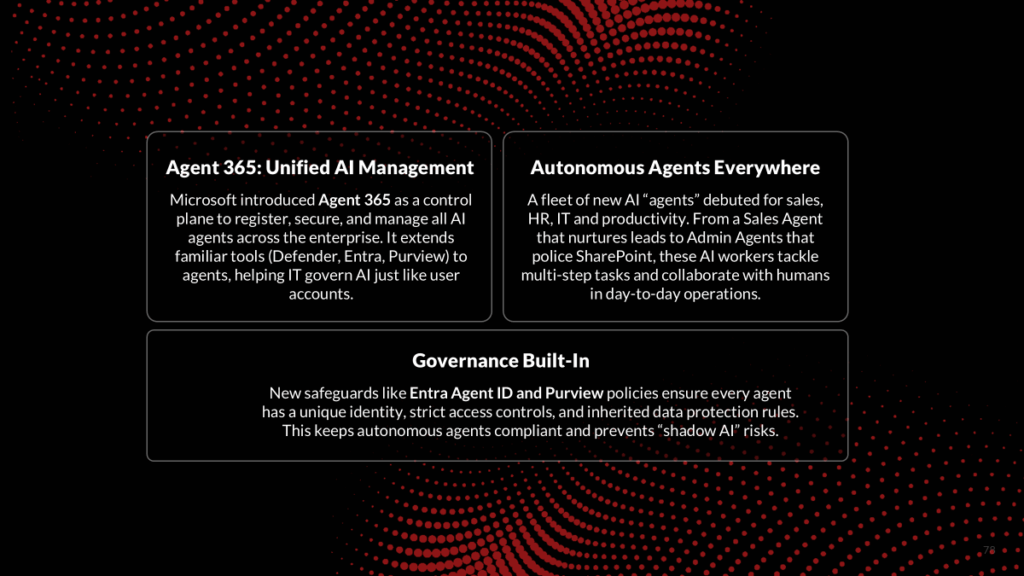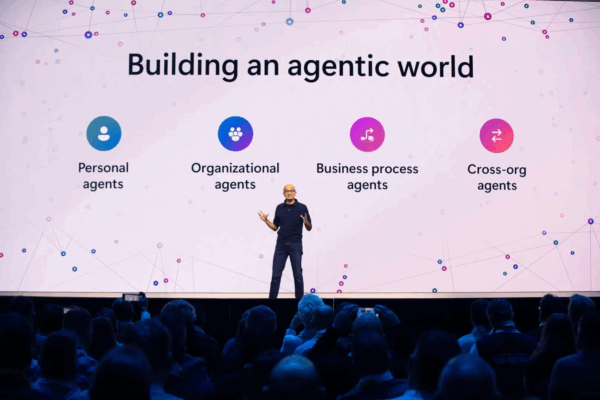Microsoft Ignite 2025 marked a pivotal shift in enterprise AI strategy, introducing a new generation of autonomous agents and the governance tools needed to manage them responsibly. From sales and HR to IT and productivity, Microsoft’s announcements signal a future where AI agents are not just assistants—but active participants in business operations.

New AI Agents: Expanding the Autonomous Workforce
Several new AI agents debuted at Ignite, each designed to automate and assist in specific business processes:
- Sales Development Agent – a fully autonomous sales AI that researches prospects, qualifies leads, and engages in personalized outreach to grow the sales pipeline. It works around the clock to nurture leads (via emails or meeting scheduling) and can hand off hot prospects to human sellers when needed. Sales teams can scale outreach and ensure no lead is overlooked, driving revenue growth without proportional headcount increases. (Preview via the Frontier early access program in Dec 2025).
- Agents in Microsoft Teams Channels – collaboration agents that live in Teams channels and can interact with third-party apps and other agents through the new Model Context Protocol (MCP). For example, a project team’s channel agent can automatically pull issue trackers from Jira and then schedule follow-up meetings based on the risks identified. Teams users get a proactive AI teammate that bridges data across tools and coordinates team tasks, improving productivity and cross-app workflows. (Now in Preview).
- Workforce Insights, People, and Learning Agents – a trio of HR and employee experience agents powered by Microsoft’s Work IQ intelligence layer. The Workforce Insights Agent provides leaders with real-time analytics on team composition, skills, and attrition to inform data-driven HR decisions. The People Agent helps employees find colleagues by expertise or role and suggests the best ways to connect (e.g. highlighting shared projects). The Learning Agent delivers personalized micro-learning and upskilling content to each employee, tailored to their role and goals. These agents enhance workforce management and development – leadership can respond faster to organizational trends, and employees benefit from stronger internal networks and continuous skill growth. (Available in Preview via the Frontier program.)
- IT Admin Agents (Teams and SharePoint) – new agents to assist IT administrators in managing Microsoft 365 environments. The Teams Admin Agent (preview) resides in the Teams Admin Center and can automate routine admin tasks like monitoring meeting quality or provisioning users, executing these workflows autonomously and securely. Meanwhile, the SharePoint Admin Agent (preview) helps govern SharePoint by monitoring for inactive or ownerless sites, overshared files, or permission sprawl, then applying policies or automatic fixes such as archiving sites or adjusting access rights. These admin agents reduce IT workload and enforce best practices consistently – ensuring collaboration platforms stay well-configured, secure, and compliant without requiring constant manual oversight.
Microsoft also announced Office Copilot Agents for Word, Excel, and PowerPoint within Microsoft 365 Copilot chat, which can generate and format content in those apps based on user prompts. These content-creation agents, while not fully autonomous, help users produce high-quality documents, spreadsheets, and presentations more efficiently. They are available in early access for Copilot customers.
Governance Tools: Managing AI Agents with Confidence
Recognizing that deploying dozens or even hundreds of AI agents raises new oversight challenges, Microsoft introduced governance tools to help customers adopt agents safely and transparently:
- Microsoft Agent 365 – “the control plane for agents” that extends Microsoft’s existing management infrastructure to cover AI agents. Agent 365 provides a unified dashboard for IT to register, monitor, and secure all agents in the organization. Its core features include an Agent Registry (an inventory of every agent, including those built in-house or by third parties), Access Control to limit what data/resources an agent can access (applying conditional access and least privilege principles), Visualization tools to map relationships between agents, people, and data and to watch agent behavior in real time, and built-in Security integration (with Microsoft Defender and Purview) to detect threats or data leaks involving agents. In short, Agent 365 lets organizations govern AI agents as rigorously as they govern human users, using familiar tools like Microsoft Entra ID and Purview that are now extended to agents. Agent 365 is available in early access (via the Frontier program in the Microsoft 365 admin center) for customers to start piloting now.
- Microsoft Entra Agent ID – a new capability in the Entra identity suite that provides unique, first-class identities for AI agents. Just as every employee has a digital identity and login, now each agent can be issued an Entra Agent ID to authenticate itself and be assigned role-based access permissions. This brings Zero Trust security to AI agents: every agent’s access can be tightly governed (e.g. a finance-focused agent gets access only to finance data) and monitored via Entra’s conditional access and risk detection. If an agent behaves anomalously or is compromised, its credentials can be revoked immediately, just like for a human account. Entra Agent ID ensures no “rogue” or unmanaged agents are operating; companies get full control over what each agent is allowed to do, reducing the risk of data leaks or unauthorized actions by AI. (Introduced at Ignite 2025; in preview as part of the Agent 365 ecosystem.)
- Microsoft Purview Extensions for AI – enhancements in Microsoft Purview (the data governance and compliance suite) to cover AI-generated content and agent activities. Data Loss Prevention (DLP) policies in Purview now apply to interactions with Copilots and agents, preventing sensitive information from being disclosed by an AI. For example, if an internal user asks an agent a question that would output confidential data, Purview can block or mask that response. Additionally, Purview’s Data Security Posture Management (DSPM) can now discover and assess all AI agents running in the environment (including third-party agents) and flag any that pose compliance risks. Audit logging and eDiscovery are extended to agent actions, so every decision an agent makes can be traced for compliance and analysis. Organizations can embrace AI automation while maintaining their compliance obligations and security safeguards. The same oversight used for user actions (DLP, audit logs, risk management) will automatically cover AI agent actions, which is critical for industries with strict regulatory requirements. (Purview’s AI governance features began rolling out at Ignite in preview form.)
- Foundry Control Plane – for companies developing their own AI solutions, Azure’s Foundry platform introduced a control plane paralleling Agent 365’s capabilities. It allows development and ops teams to set policies, monitor performance, and manage costs for custom-built agents across their lifecycle. By using the Foundry control plane, even AI agents created with open-source tools or non-Microsoft frameworks can be brought under a unified governance umbrella. This ensures that custom AI projects don’t become a governance blind spot – they too can be centrally managed for security and compliance from day one, making enterprise AI portfolios more coherent and controlled.
Impact
The Ignite 2025 announcements underscore a dual message: significant productivity gains are now within reach through AI agents, and Microsoft is delivering the controls to deploy these agents responsibly. The potential benefits include:
- Boosted Productivity and Automation: The new agents can handle labor-intensive tasks – from scouring CRM systems and sending outreach emails (Sales Agent) to auto-monitoring IT systems (Admin Agents) – which frees up employees to focus on higher-value strategic work. Early adopters can expect faster cycle times (e.g. quicker lead follow-ups, faster issue resolution) and extended service availability (agents working 24/7).
- Improved Employee and Customer Experiences: AI agents embedded in everyday workflows mean employees have on-demand assistance. Projects move faster when a Teams channel agent can gather data or schedule meetings automatically. Employees get personalized support in learning and finding information via the People and Learning agents. Customers, in turn, benefit from more responsive service (since AI can help address their needs instantly or outside of business hours). Overall, these agents promise more proactive, responsive operations in many areas of the business.
- Enterprise-Grade Trust and Control: Perhaps most crucially, Microsoft’s focus on governance provides IT leaders and compliance officers the confidence to scale AI usage safely. Features like Agent 365 and Entra Agent ID mean that introducing an army of AI agents won’t result in loss of visibility or unchecked access to sensitive data. Every agent is accounted for, governed, and subject to security and compliance rules. This lowers the barrier to adoption because organizations can enforce their existing security policies on AI agents just as they do for employees, preventing the kind of “shadow AI” chaos that uncontrolled agents might cause.
Microsoft Ignite 2025 marked a clear shift from AI as a mere assistant to AI as a full-fledged workforce layer, with Microsoft unveiling a unified agent ecosystem across Microsoft 365, Windows, and Azure, centered on Agent 365, a control plane for registering, securing, and managing agents with Entra-issued IDs. New features include Work IQ for personalized agent recommendations, dedicated Office and industry-specific agents, and Windows’ native agent infrastructure for secure integration. The message was clear: the future of work is agent-powered, but trust, compliance, and control must be built in from the start.
Table: Key Announcements on AI Agents and Governance (Ignite 2025)
| Feature / Tool | Description | Impact | Availability |
| Microsoft Agent 365 | Central command center for AI agents – provides a registry of all agents, access controls, real-time monitoring dashboards, and integrates security/compliance tools (Defender, Entra, Purview) for agents. | Enables IT to manage and secure AI agents at scale just like user accounts. Increases trust by preventing unmanaged “shadow” agents and enforcing consistent policies (identity, data protection) across all AI-driven processes. | Early Access Preview (Available now via the Frontier program in the M365 admin center.) |
| Microsoft Entra Agent ID | New identity management for AI agents – assigns each agent a unique Entra ID identity and credentials, with full support for Conditional Access and audit logging of agent sign-ins. Extends Zero Trust security to autonomous agents. | Tight access control for agents: Every agent operates under a known identity and role, so companies can apply least-privilege access and instantly revoke or adjust an agent’s permissions if needed. Builds trust that agents will only reach the data they’re authorized to use. | Preview (Introduced at Ignite; part of Entra updates rolling out in late 2025.) |
| Sales Development Agent | AI sales representative that autonomously researches prospects, crafts outreach emails, follows up with leads, and hands off interested customers to human sellers. Integrates with CRM systems (Dynamics 365, Salesforce) and works within Outlook/Teams to drive pipeline. | Scales up sales capacity by ensuring every lead is engaged promptly and persistently. Sales teams can convert more leads without adding staff, as routine prospecting and follow-ups are handled by the agent (with consistency and no downtime). | Frontier Preview (Available to test for participants in Dec 2025.) |
| Teams Channel AI Agents | Intelligent agents embedded in Microsoft Teams channels that can collaborate with users and connect to third-party apps via MCP (Model Context Protocol). They can aggregate data from other services (e.g. project trackers, DevOps tools) and initiate actions like scheduling meetings or updating tasks. | Enhances team collaboration by acting as a smart coordinator: the agent surfaces information from across the toolchain into Teams and automates cross-app steps. Teams become more productive as the agent reduces the need to manually check different apps or remember follow-ups. | Preview (New capability in Microsoft Teams, announced at Ignite 2025.) |
| Workforce Insights & HR Agents | A set of Work IQ-powered agents for HR: Workforce Insights Agent (real-time org analytics for leaders), People Agent (find colleagues by skill/role and suggest connections), Learning Agent (personalized training and upskilling content). | Data-driven people management and development. Leaders gain immediate insight into workforce composition and trends for better planning. Employees can more easily network internally and get targeted learning resources, leading to a more connected and skilled workforce. | Preview (Available via Frontier program as of Ignite 2025.) |
| Teams & SharePoint Admin Agents | IT administration agents for Microsoft 365: one in Teams Admin Center to automate tasks like user provisioning and system monitoring; another in SharePoint Admin Center to audit and fix site issues (inactive sites, oversharing, permission drift) via AI. | Always-on IT assistance that improves governance. Routine admin tasks are handled consistently and faster, reducing IT effort and human error. These agents also proactively enforce policies (e.g. cleaning up unused sites or tightening permissions), which strengthens security/compliance across collaboration platforms. | Preview (Both announced in preview at Ignite 2025.) |
| Microsoft Purview AI Governance | Purview compliance features for AI – extended DLP policies to monitor and block sensitive data in AI prompts or outputs; Purview’s DSPM now inventories all AI agents and assesses their risk posture; audit trails cover AI agent activities for eDiscovery and oversight. | Maintains compliance and security in an AI-driven environment. Companies can trust that adopting AI agents won’t lead to data leaks or compliance violations, because existing data protection rules automatically apply. Every action by an agent is logged and auditable, which is crucial for industries with strict regulations. | Preview / Rolling Out (Announced at Ignite; incremental rollout through late 2025 into 2026 for various Purview enhancements.) |


